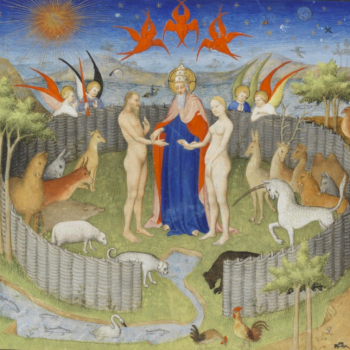
Names are important in all societies. They can tell us about a person’s job and some names like Miller and Cooper speak to a family’s historical occupation. Other names represent a family history, all our girls are named after a past member of our family and a Christian attribute. This week, I want to look at the importance of of names and specifically look at the names of God found in the Abrahamic traditions as we consider the name that Jesus uses for God when he is on the cross.
I spent a year a few years ago with a Sufi teacher. While he did not specifically talk at length about his experience and tradition, he offered enough to wet my interest. During our discussions, he would share beautiful insights about how each name of Allah represents a different attribute or quality of the divine, inviting a deeper connection and understanding of God’s nature. This notion of multifaceted divine names resonated with me and led to a deeper exploration of the names of God in the Abrahamic religions. These names are not just simple labels but reflect profound aspects of faith and the relationship between the divine and humanity.
This week, I want to reflect on the Sufi tradition, the 99 names of God and how this cousin to Christian mysticism can be a powerful teacher.
Christianity’s Wise Cousin
A succinct and well worded definition from Wikipedia offers this description of Sufism, “Sufism is a mystic body of religious practice found within Islam which is characterized by a focus on Islamic purification, spirituality, ritualism, and asceticism. Practitioners of Sufism are referred to as “Sufis”, and historically typically belonged to “orders” known as tariqa — congregations formed around a grand wali who would be the last in a chain of successive teachers linking back to Muhammad, with the goal of undergoing tazkiya and the hope of reaching the spiritual station of ihsan.”
Perhaps one of most well-known Sufi Mystics was Rumi. Rumi, was a 13th-century Persian Sunni Muslim poet, theologian, and Sufi mystic. Born in present-day Afghanistan, he spent most of his life in Konya, in present-day Turkey, where he wrote extensively in Persian, Arabic, and occasionally Turkish and Greek. His mystical poetry and teachings on divine love and unity have had a profound and lasting impact on Islamic and global spirituality.
Like it’s sibling and cousins, Judaism and Christianity, Islamic Sufis believe that God (Allah) is unknowable, ungraspable (How God was revealed to Moses in Exodus 3). According to Islam, the only way we can know Allah is through His Names, His Qualities. If the Reality of God was a brilliant gemstone, it would have 99 facets, and each facet would be a unique quality of God. This is one way of perceiving the Qualities or Names of God.
The Name of God as Used by Jesus and Its Correspondence to the 99 Names in Sufism
Since my time in Seminary, I have been an advocate of open theism and, more recently, I have appreciated the concepts proposed by Thomas J. Ord regarding open and relational theology. The notion of the future being indeterminate and events unfolding as they occur, coupled with the understanding of God’s immanence in the present moment, provides insight into how Jesus perceived God when he referred to Him as Abba.
When we think of the names of Jesus such as son of man, son of God and other earthly kingly titles, we are often superimposing names of Ceasar over Jesus to promote his majesty or his kingly might. When Jesus talked about kindom, he believed it to be eschatological and imminent: He expected it to arrive soon, in the immediate future, accompanied by cosmic events and judgment.
When we consider the 99 names of Allah, we will find that these names enrich our prayers and gives names of God that we are asking to show up in our prayers. When we consider the divine presence in us, and we pray for these divine attributes to show up in us, we learn to move away from our ego state and towards our divine center.
In Closing
This exploration into the multifaceted nature of divine names invites us to embrace a broader and more profound understanding of the divine. As we reflect on the names of God across different traditions, we recognize the vastness of the divine qualities that transcend human comprehension yet are intimately accessible through prayer and meditation. The practice of invoking these divine names, whether in the Sufi tradition, through the 99 names of Allah, or in Christian prayers referring to God as Abba, enriches our spiritual journey and deepens our connection to the divine. This week, let us open our hearts to the divine attributes and allow them to transform our inner lives, leading us towards a greater sense of unity and divine presence.

















